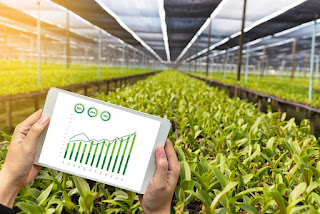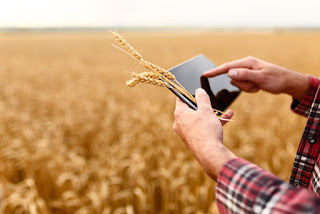Blockchain
Ever wonder if there's an easier way to complete transactions without having to deal with online wallets, banks and third party applications. Yes, it is possible and all thanks to Blockchain technology.
Let us imagine, four friends; Ashok, Himal, Chintan and Bishesh meet up for lunch. After they are done, Ashok pays the bill and they decided to split up the share among each other. On he next day, Himal send his share via online transaction. The transaction was successful but the transaction of other friends was invalid. This may be due to:
- Technical issues at bank
- Account was hacked
- Transfer limit exceeds
To solve such incurring problems the concept of cryptocurrency came into existence.
what is cryptocurrency?
what is cryptocurrency?
 |
| Blockchain |
Let's go back to the above example. Himal, Chintan and Bishesh send two bitcoins each as their contribution for previous lunch. Let us assume that Himal, Chintan and Bishesh has 3 bitcoins each in reserve while Ashok has 5 bitcoins. First, Himal send two bitcoins to\Ashok and a record is created in the form of block. The transaction details between these is permanently inscribed in this block. This record also holds the number of bitcoins each friends own now. So, after Himal's transaction Ashok has 7 bitcoins while Himal has one. Chintan and Bishesh also send 2 bitcoins each to Ashok and a new blockchain is created for each transactions. These blocks holds the transaction details as well as the number of reserved bitcoins of Ashok, Chintan and Bishesh. These blocks are interlinked with eachother as each of them takes reference from previous one for recording the number of bitcoins each friends own. This chain of blocks is called ledger and this ledger is shared among friends which acts as a public distributed ledger. This forms a basis of blockchain.
Now, What happens when Himal has only one bitcoin left and he tries to send two more bitcoins to Ashok; the transaction won't take place. This is because all his friends has a copy of the ledger and it is clear that he has only one bitcoin left and Ashok will flag this transaction invalid. A hacker will not be able to alter the data in the blockchain because:
- Each user has a copy of ledger.
- The data within the block are encrypted by complex algorithms.
All of this is made possible by the help of blockchain technology. Many such transactions are taking place all over the world. These transactions are validated and then added block by block. People who validate the blocks are called miners. For a block to be validated, miners need to solve a complex mathematical problem. The miner who solves this 1st is awarded with 12.5 bitcoins. The process of solving the complex mathematics is called work proof.
In simplest terms, a blockchain consists of a linked chain that stores auditable data in units called blocks. Blockchain is also referred as "Internet of value"; a secure way to store and transact value anything from currency, stocks, contracts and even votes from one entity to another. A blockchain by design is a cryptographically secured, distributed and decentralized system. This technology can be used in many fields likewise; financial sector, digital identity, education sector, Logistic sector, health sector, Insurance, Energy sector and Agriculture globalization too.
Blockchain in Agriculture
The use of data and information is vey much crucial for increasing the productivity and sustainability in agriculture. Blockchain technology allows agricultural practitioners and farming communities to obtain day to day information and thus make better decision in daily farming. For instance Remote sensing data on soil conditions helps farmers crops management, mobile phones reduce information cost and thus promote farmers' access to the market. Now the question is how will blockchain technology in Agriculture helps to bring revolution in the food supply from food to plate?
 |
| Blockchain in Agriculture |
Blockchain technologies in Agriculture
Agriculture has many growing issues which needs to be solved for its betterment. So the blockchain technology can be used to simplify some of its issues.
- Every farm manager is facing the problem of dependence on the third party for coordinating the goods delivery. The involvement of multiple agents add high cost to the system and makes the entire process time consuming. The challenge for agriculture is to track the delivery and payment of the goods. With the blockchain the entire process can be simplified into a single ledger.
- The smart farming helps the farmers giving them the useful information on temperature, soil conditions, water level, fertilizers details etc and they could take specific actions. It helps to enhance the quality of farming.
- Many small farm holders are facing the problems of transparency in credit history and agreements. Because of this, they cannot invest much in farming as the repercussion of the unfair agreements and also they have to sell their products at the lower prices. Hence, with the blockchain technology the agricultural finance becomes more transparent and fair.
- Agriculture has always been a risky business and weather conditions is one of the factor responsible for that. Due to excess or less of the factors like rain, temperature, humidity etc farmers have to face man problems and in such condition predicting such factors could be crucial. And due to the global warming and green house effect, the business is riskier than ever and tracing the weather conditions using blockchain technology could be a relief.
- Agricultural insurance is must for any farmers. Low cost agricultural insurance schemes are viewed as mechanisms for providing social protection to the farmers. Index insurance based on smart contracts can automate and greatly simplify the process thereby facilitating instants payouts in case of any weather accidents.
- The land registrations could be simplified by implementing the blockchain which shall maintain a transparent ledger of land records.
- The illegal and unregulated fishing, which is a threat to marine ecosystem can be tracked using blockchain technology.
- The use of blockchain technology helps establish a trust relationship between producers and consumers and build up the reputation of their products, by transparently providing individual product information in the blockchain.
- The e-commerce of Agricultural products shall be simplified.
The blockchain enables the traceability of information in the food supply chain and this improves the food safety. It provides a secure way of storing and managing data. In addition, it can reduce transaction costs, which will benefit farmers' access to the markets. Despite huge potential, there are some limitations for applying blockchain technology in Agriculture which are enlisted below:
- The blockchain works on the principle of "hard to create, easy to verify", which means a lot of energy needs to be spent by node to earn tokens. For a large chain like bitcoins, estimates data size exceeding 100 gb and huge electricity requirements.
- The policy and regulatory framework entails high risk as it is in its infancy.
- Unlike other blockchains, public blockchains have low transaction speeds.
Some examples of blockchain technologies being applied to agriculture are:
- FARMS: Financial And Agricultural Risk management For Smallholders
- AgriDigital
- AgUnity
- TE FOODS
- Hello Tractors
- AgriLedger
- BanQu






1 Comments
Sands Casino & Hotel | Entertainment | Las Vegas, NV
ReplyDeleteFind the best of Las Vegas, NV and the 바카라 사이트 next big thing in Las Vegas at Sands Casino & Hotel, Las Vegas. 샌즈카지노 Caesars Palace and Wynn 1xbet korean Las Vegas are the best hotels in Las Vegas